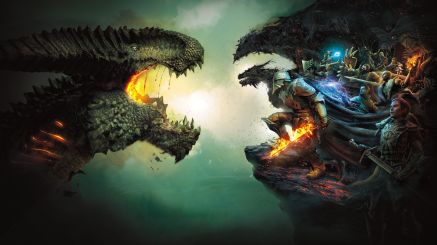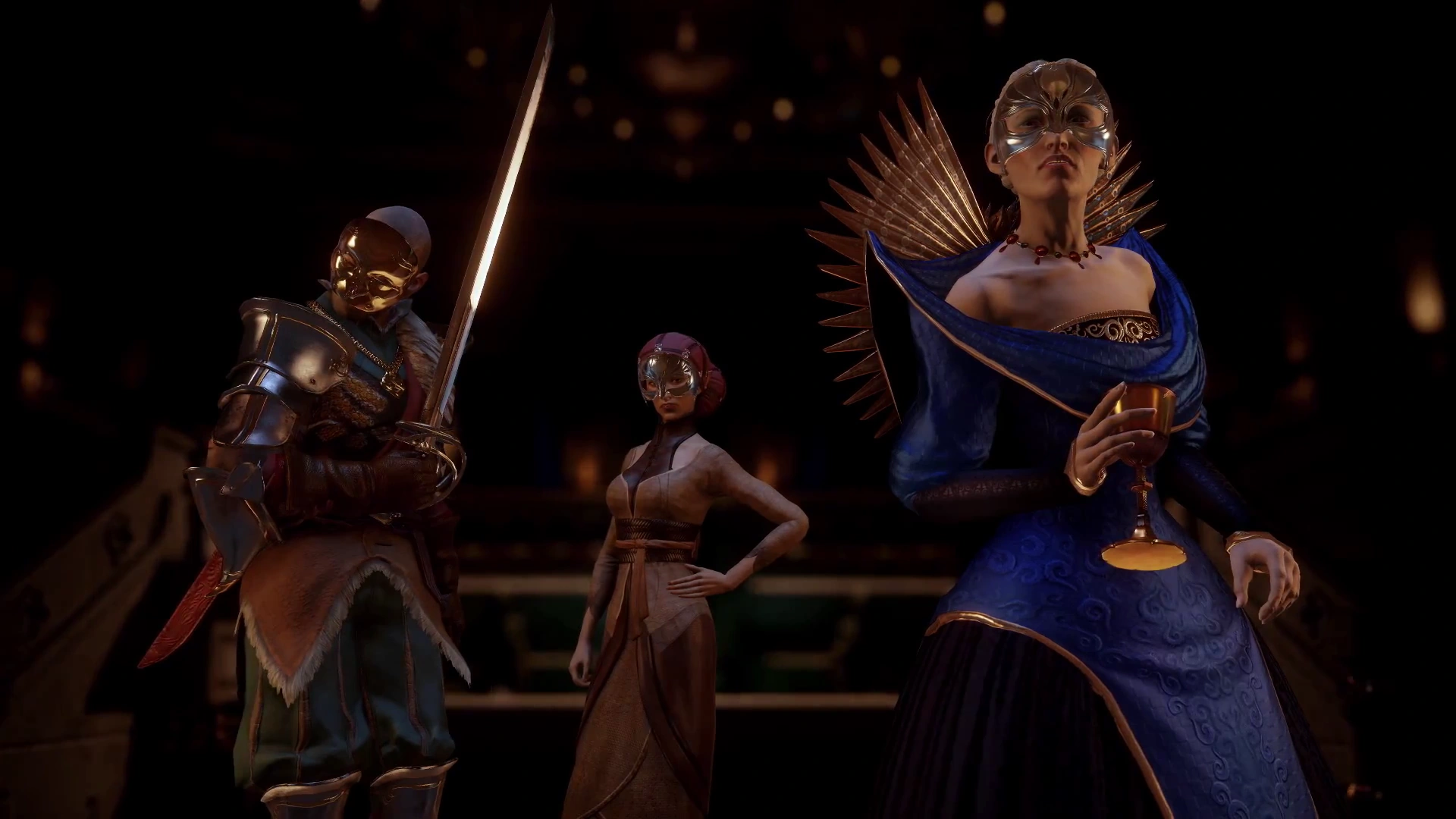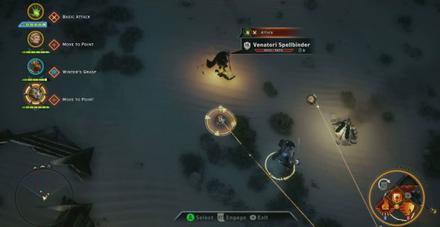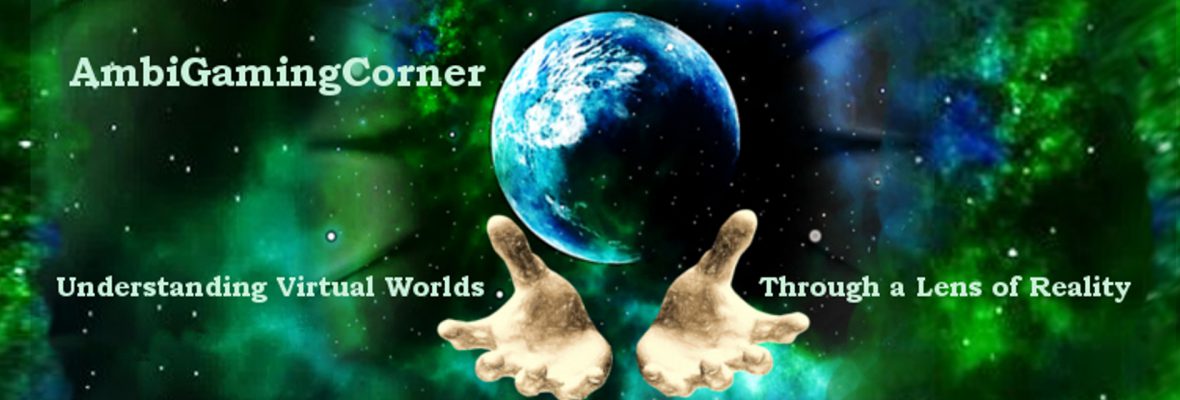Last month, we talked a bit about the implications of the mage-templar war as developed in the Dragon Age series, particularly how it relates to the current political climate in the United States. As regular readers know, I’m a huge Dragon Age fan, and I could probably do an entire Dragon Age month to complement our recent Mass Effect Month if I didn’t think I would bore you all to tears. But this third installment in the series has a lot of interesting nuances, from expanding on the theology to questioning politics and even taking on world-building. Those may come up in later posts, but today I’d like to take a step back and take a look at what makes the game tick.
Please note that this will not be a review of the game. It’s great and has so much to offer and I loved almost every minute of the 130 hours I’ve dumped into it thus far. For a great review, check out Falcon Game Review’s fantastic breakdown here.

I was watching a Let’s Player on YouTube a while ago, and I made a foray into the comments section after one of the videos, and where I originally expected venom about one thing or another, I actually found (gasp) intelligent conversation. But one theme kept coming up again and again.
“Great game, but doesn’t compare to Origins.”
“I love this game! But I still wish my Warden would come back.”
“This game has some epic moments, but nothing will ever take Origin‘s place in my heart.”
…and no, that wasn’t me leaving all those comments.
But it got me wondering what it is about Dragon Age: Origins that pulls so many people back to it, this many years (and so much graphical improvement) later. I even found myself pulled toward the familiar Origin characters more than any other group of people in Inquisition, even Varric and Cassandra, who I will unhesitatingly say that I love as examples of great characters.

Was this all nostalgia? Or was there some other magic that Origins had that Inquisition couldn’t hope to copy?
Two Sides of the Same Coin
Like any good developer, BioWare took its previous games and learned from them. So Inquisition benefitted from the best of the previous two games in the series, but without the same pitfalls. There are a lot of ways this installment and the series opener are the same, however. Most noticably is the return of the origins choices; each Inquisitor can hail from either an elf, dwarf, or human background, and now have the added qunari origin, as well, adding a nice flavor to the game that was first seen in Dragon Age: Origins. The differences between races weren’t Thedas-shattering in the first game, and so it’s the same here, but there are times when different races have different perks, making the world dynamic and alive in a way that always playing as a human might not.

For instance, during one quest, the Inquisitor needs a certain level of approval from the Orlesian aristocracy, but elves are looked down on. Thus, an elven Inquisitor starts off with a lower approval level. Similarly, characters in Origins would also occasionally comment on the Warden’s background, so it was a nice touch to add in.
Likewise, the two games had a system of choices that opened some plot options and closed others. pick origins, main quest lines (pick between two exclusive choices),
The Same, Yet Different
As fans of the series know, Dragon Age games allow the player to program the companion characters to have certain tactics that they follow, based on the movements of enemies or the needs of the other characters. But unless you were playing on a computer, those tactics were limited to organizing during “downtime” in the game; once a battle commenced, the player could not micromanage the companion’s powers. In Inquisition, though, BioWare added real-time tactics, which paused the game and allowed you to survey the field and control what power or attack each companion used, and on which enemy. This improved on the console tactics of Origins and Dragon Age II, but kept the autonomy of each character, as well, as everyone had their own “playstyle” to based on how the player was building them.

Likewise, the text options were similar. Although Origins had a silent protagonist – and therefore provided the player with full sentences to choose from – and Inquisition improved sightly on DAII’s system, adopting a more Mass Effect-style dialogue wheel, the moral ambiguity was captured well, like in previous titles. A new addition was the approval system. While Origins let you cheat by not taking certain companions if you thought they wouldn’t particularly like the decisions you’d be making, in Inquisition all of your companions find out what you do during each quest, and weigh in on it, adding another layer of balancing social relationships to the already convoluted politics and plot being waded through.
The Deviation and the Down-Low
This series has gone through a bit of a story evolution…

Yeah. The plots of the first two games are fairly straightforward (even Dragon Age II and its many story threads), but I remember sitting and literally taking notes about what was going on in Inquisition, trying to piece together the overarching story that the game kept alluding to but never actually pinned down. That doesn’t make it a bad story, it just was a story that was so much larger than the other games, and sought to expand on the world, slap down the Dalish elves, and take on its own theology, all in 60 hours. So that was a bit of a shock, but somehow managed to pull itself together enough to not be seen as hoaky or as taking itself too seriously.
But I think the big difference between the first and third installments is how the main character was portrayed on screen. The silent protagonist of Origins causes the dialogue options to be written in full: we are thus able to superimpose our own tone of voice onto them.

This is an immensely important point. Literally assigning our voice onto a non-human object – called personification – is a technique used by humans to attribute human characteristics to a non-human object. When you pretend your dog or cat is commenting on something, that’s personification. When you talk about your bed missing you, that’s personification. But why is this important, and how can it make one game so much more memorable than another.
The Human Touch
Personification is important, particularly when writing, precisely because it make a non-human object/animal more relatable to us. Humans relate to humans better than to any other type of thing, living or inanimate, and so when we can see human characteristics in something, we are more likely to relate to it.

If our dog looks at us when we take our fourth cup of coffee, and we say, “I know, I know. I shouldn’t have anymore. You’re just looking out for me”… all of a sudden the dog isn’t just looking at us. The dog is commenting on us, and interacting with us like a person would. Or, at least, that’s how we interpret in subconsciously. And so the dog goes from being a “dog” to being our “friend.” Personification heightens emotional connection.
This happens in Dragon Age: Origins each time you need to give your own voice to one of the six sentences available for the Warden to use as a response. But now, it’s your voice. It’s your emotion. It’s your way of talking.
It’s you.
So while I certainly loved hearing Samantha Traynor’s voice come out of my Inquisitor, I was simply controlling a character. In this case, I wasn’t superimposing my own voice onto the character, and so I wasn’t being forced to put something of myself into the character on screen. Controlling the lines someone says isn’t the same type of emotional interaction as personifying an object. Instead of drawing parallels, however subconsciously, between ourselves and the character, we are “only” able to empathize with him/her.
What do you think? Are silent protagonists really all that different from voiced ones? Do they have any benefit? Have you played these two games? Do you have a preference? Which is it, and why? Let me know in the comments!
Thanks for stopping by, and I’ll see you soon!
~ Athena
Is your subscription to our blog not enough? Do you want more AmbiGaming? Of course you do! So you should definitely book us a face on our Facebook page and follow us on Twitter @TheAmbiGamer and say hello! You can even find us on Google+, if that’s your thing, and if you’re really adventurous you can check out our Let’s Plays.


If you asked me this prior to playing Fallout 4, I might’ve had a different perspective. Fallout 4 and Dragon Age: Inquisition fell a bit flat in the performance department in my opinion, but not because of bad voice acting or anything like that. I feel like he combination of a customizable main character with a single, or small set of voice actors/actresses, hurt those titles however. The voices don’t always match the person you made. Like you said, it takes away from your immersion in your created character…
LikeLiked by 1 person
Yeah, it’s hard to really “reach” everyone with what amounts to – really – a limited number of options. While I think this is fine in games that don’t allow you a customization option (or are games for which the players aren’t expecting to really “role play”), it’s difficult (for me) to rationalize taking away the imagination from a genre that has its roots in DnD, a rich, story-driven RPG that can essentially be played with a piece of graph paper and the players’ creativity.
LikeLiked by 1 person
I know what you mean about the dialogue. Sometimes in inquisition I’ll select an option I think sounds good then my Inquisitor will say something which is not at all what I thought it meant or they will have a tone that comes across as nasty when what I thought I was saying was just a bit sarcastic or funny. Also the voices you get to choose from aren’t particularly different, I’ve played games before where they match the voices to a personality (although that’s more just shouting stuff in battle rather than a full script) and that is quite cool. Still love inquisition though!
LikeLiked by 1 person
It’s a good game, for sure, and I’m definitely a fan who’s played it a few times with multiple Inquisitors! And I did like how in Origins they had you pick a voice for those types of exclamations; for me it didn’t break that personification piece, but still gave the character a voice during instances that required, well, a yell of some sort!
But some of those options in DAI, man… they were not always clear as to what the dialogue would actually be! haha
LikeLiked by 1 person
The worst thing is when you choose something which comes out as somehow the opposite of what you intended and the “so and so disapproves” appears in a long list at the side of the screen. I reloaded it a couple of times because of that!
LikeLiked by 1 person
Yeah, there were a number of times I was very shocked at the words that came out of my Inquisitor’s mouth. Luckily on games there’s a reset if it gets really out of hand, though 🙂
LikeLiked by 1 person
I love personification, and I love that you defined it and gave it an actual term for me to use. I do this day to day whenever I play games like this or read or book or as you said, both my wife and I give our dog her voice. It’s fun!
It makes things more personal for me I suppose, I even do it if friends text me and I hear their voice in my head. Not sure if that’s the same thing.
Whether I prefer it to having a voiced character, it depends on the writing. If the writings good then I’m all for it, because there’s nothing better to act out a well written line the way you want it.
Taking from an example, Xenoblade Chronicles X has silent protagonist but lacks actual lines and totally breaks my connection to that character.
LikeLiked by 1 person
Glad to help! haha Yeah it’s a very common thing that people do, for the reasons you’ve said – it just makes things more personal!
And there is such a thing as “too silent,” I think. If it seems like the person is *incapable* of interacting with the environment, then it absolutely begins to backfire. But I think when most of the dialogue is unspoken, yet maybe there are “exclamations” within the game, it helps a little bit.
LikeLiked by 1 person
There are a lot of reasons I prefer Origins to Inquisition and keep coming back to it. You’re inspiring me to write a post comparing them a little! I have to say, I wouldn’t have thought the silent protagonist was one of those reasons, but your point here makes so much sense. There is a disconnect in role-playing when you select a dialogue option for your character and hear someone else’s voice come out, sometimes in the wrong tone… or just with totally different dialogue than what the selection said. That can throw things off, and while I enjoy a lot of voice acting (especially FemShep!), I can totally see the value of a silent protagonist.
Also, I had no idea the Inquisitor’s voice was the same as Traynor’s! I have to listen to them both again now…
LikeLiked by 1 person
I’d love to read your comparison of the two games! There is definitely merit to both voiced and silent protagonists in games, and the latter can be hard to pull off, but it just works so *well* when it does! And I love Jennifer Hale as FemShep, too 🙂
She is! The English-accented female Inquisitor has the same voice actress! I was so shocked when I realized that!
LikeLiked by 1 person
It’s only fair that you do a Dragon Age month too! I know I’d like to hear more about the games. It might make me finally finish HZD and start playing Origins, haha. Also, you go into the YouTube comment sections? Wow! You are much braver than I am…
You’ve brought up a very interesting point that I never thought of before (as usual, haha). I can’t speak for Dragon Age (yet), but I noticed this in the Fallout series, now that you mention it. I really felt connected to Fallout 3’s depressing world, and I’ve been questioning why I can’t seem to get into Fallout 4 (even though I think the game is great). Now I think I know the answer to my nagging question! Fallout 3’s protagonist is silent, and Fallout 4’s is very mouthy, haha. Thank you, oh wise Athena 🙂
LikeLiked by 1 person
Oh, goodness. Don’t tempt me like that haha And yes, I was surprised as anyone to find civil conversation happening on YouTube, as well!
That’s interesting about the Fallout series. I’ve never played them (watched bits on YouTube), but I’d believe that difference really changes an experience, especially if silent protagonists are done well.
HA! Anytime, my electrifying friend.
LikeLiked by 1 person
I am absolutely shocked you were able to find some non-toxic comments on Youtube. I didn’t think it was possible.
I still have a really strong love for the silent protagonist, but I think they’re often under-used. I love having an avatar to more directly project myself onto, and having a set personality may make it harder to do that. It gets a lot harder in dialogue-heavy games though, and if your character doesn’t actually have something to say to the others, they fill more like a walking plot element rather than an actual character. It takes some work to make it work.
LikeLiked by 1 person
Me, too. I was quite flabbergasted myself.
I enjoy a good silent protagonist as well, even though I think devs are having a harder time justifying them as more and more games move away from them. And like you said, they take a lot of careful developing to work!
That’s interesting what you say about the characters not having anything to say. Do you mean, not verbally responding as in exclaiming something, or actually saying a line of dialogue? I’m thinking (again) of DAO, where the Warden shouts various things during battle, but doesn’t actually deliver his or her lines.
LikeLiked by 1 person
So, funny thing, I’m playing through Persona 5, and sometimes the lines characters say are voiced, sometimes they’re just text, and when I’m thinking back on it, I can barely remember which is which. I was thinking more of the character not actually having any lines. I’ve found that not having voiced lines doesn’t really matter to my experience except in cinematic or visual-energy-heavy moments, but if a character doesn’t have any lines, voiced or not, it’s a bit harder to see them as a character.
LikeLiked by 1 person
That’s a good point. Having a character be completely mute (like Claude from GTA3) is just strange and makes the character less relatable. And it’s so interesting that the line between voiced and not-voiced didn’t make an impact! I guess it really comes down to the dialogue writing…? Hm….
LikeLike
Great thought-provoking article! I haven’t played either of the games, but I love what you said about personification. I don’t feel that so much in the silent protagonist games I’ve played, perhaps because they usually only have one or two-word responses, like Link in Legend of Zelda. Funny enough, on the topic of Link and silent protagonists, they sort of give a reason why Link’s silent. It’s not a real reason, but it could be interpreted that way, which made me laugh. I do think that the difference between feeling close to a character or not depends on how much choice you’re given into what they say and how they interact with others, voice or no voice.
LikeLiked by 1 person
Glad you liked the article! The depth of choices available absolutely makes a difference, so I wonder if having, say, a voiced Warden that had the same level of customization, back-story, and clear dialogue world have the same effect on players, then. Hm. That’s something to think about….
And now you’ve made me curious. I’m not sure I’ve heard the reason for Link’s stoicism!
LikeLiked by 1 person